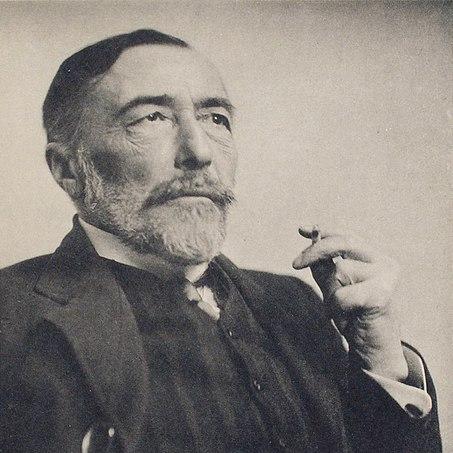“I had the conviction that you would understand my unusual talkativeness”
Joseph Conrad to Bertrand Russell
September 13, 1913

Polish born novelist Joseph Conrad (1857-1924) is regarded as one of the greatest writers of English literature, authoring such masterpieces as Heart of Darkness and Lord Jim. In 1913, Conrad was living in Capel, a village near Ashford in Kent, where Russell’s lover, Ottoline Morrell, was introduced to him by Henry James. Ottoline was completely charmed by Conrad and arranged for Russell to meet him. Russell visited Capel on September 10, 1913. By that time, he had already read and greatly admired Heart of Darkness and came away from the meeting overcome by a sense of deep connection with the older man. From the train after the meeting, he wrote to Ottoline: “Here I am on my way back from Conrad. It was wonderful. I loved him and I think he liked me. … He seemed to feel I had understood him; then he stopped and we just looked into each other’s eyes for some time. … His eyes in the moment expressed the inward pain and terror that one feels him always fighting.”
As Conrad’s letter three days later shows, he, too, felt a rapport with Russell, though he expressed himself more reservedly: “I had the conviction that you would understand my unusual talkativeness.” Russell was likely in need of encouraging words such as these. He had recently been rebuked by his brilliant student, Ludwig Wittgenstein (see introduction to Wittgenstein letter), an experience that had left him reeling. This new friendship with a greatly admired writer must have been a balm, indeed.
Later in 1913 Russell was thrilled to receive praise from Conrad for his 1903 article “The Free Man’s Worship,” a copy of which Russell had given him. Perhaps emboldened by this, Russell shared with Conrad his efforts in the writing of fiction, namely, a manuscript he had written with Ottoline’s encouragement and even collaboration. Conrad’s lukewarm response was one of the reasons Russell shelved the work—the story “The Perplexities of John Forstice” would not be published until 1972, two years after Russell’s death.
The First World War interfered with the friendship between the two men. Conrad was away for the first part of it, and they held different views of the hostilities--Russell was a pacifist, while Conrad, whose son had volunteered, hoped for a British victory (though, as a Polish nationalist, he also hoped for a Russian defeat). It was as if they politely decided not to be in touch for a while. Their correspondence picked up again in 1921. Conrad praised Russell’s The Analysis of Mind, which was published that year, and Russell was pleased when Conrad agreed to be symbolic godfather to his son, John Conrad, born on November 16 and named after the author. (Russell would also name his second son after Conrad--Conrad Sebastian was born in 1937).
Years later, in his Autobiography, Russell wrote with regret of the last time he saw Conrad: “I saw him across the street, in earnest conversation with a man I did not know…. I did not like to interrupt … and I went away. When he died, shortly afterwards, I was sorry I had not been bolder.” Russell also reminisced about their first meeting: “At our very first meeting, we talked with continually increasing intimacy. We seemed to think through layer after layer of what was superficial, till gradually both reached the central fire. It was an experience unlike any other that I have known. We looked into each other’s eyes, half appalled and half intoxicated to find ourselves together in such a region. The emotion was as intense as passionate love, and at the same time all-embracing. I came away bewildered, and hardly able to find my way among ordinary affairs.”
Several of Conrad’s letters received by Russell were published in the first two volumes of Russell’s Autobiography, including the letter displayed here (in Volume I).
Sources: (1) Bertrand Russell. The Autobiography of Bertrand Russell, 1872-1914 (Volume I) and 1914-1944 (Volume II). London: George Allen and Unwin Ltd., 1967 and 1968. (2) Ronald W. Clark. The Life of Bertrand Russell. Jonathan Cape and Weidenfeld & Nicolson, 1975. (3) Nicholas Griffin, ed. The Selected Letters of Bertrand Russell: The Private Years, 1884-1914. London and New York: Routledge, 2002; includes Russell’s 1913 letter to Ottoline Morrell. (4) Margaret Moran, “Men of Letters: Bertrand Russell and Joseph Conrad.” Russell: the Journal of Bertrand Russell Studies. Vol. 2, No. 1 (Summer, 1982): 29-46. (5) Owen Knowles, “Joseph Conrad and Bertrand Russell: New Light on Their Relationship.” Journal of Modern Literature, Vol. 17, No. 1 (Summer, 1990): 139-153.
Capel House
Orlestone
N[ea]r Ashford
13 Sept[ember] 1913
My dear Russell,
Your letter has comforted me greatly.[1] It seems to me that I talked all the time with fatuous egotism. Yet somewhere at the back of my brain I had the conviction that you would understand my unusual talkativeness. Generally I don’t know what to say to people. But your personality drew me out. My instinct told me I would not be misread.
Let me thank you most heartily for the pleasure of your visit and for the letter you had the friendly thought to write.
Believe me sincerely yours
Joseph Conrad.
[1] Russell’s letter to Conrad after their meeting on September 10 has not survived.
Bertrand Russell Archives, Box 5.09, Document 048498. Public domain in Canada. Copy provided for personal and research use only. For any other use, the user assumes all risk.
